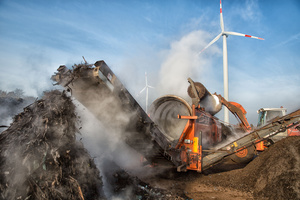Conference Biowaste 2021

Worldwide approximately 90 % of the waste is still landfilled without any treatment, in which the components of organic waste amounts 50 % to 70 %- the biggest percentage, and causes the most environmental problems. The sustainable recycling of biowaste and waste materials are part of the current topics of waste management besides plastic recycling and product responsibility, particularly in emerging and developing countries.
An environmentally friendly recycling- and waste management contributes significantly to the climate and resource protection. An example - the landfills are worldwide the third largest emitter of the greenhouse gas methane and other climate-relevant gases. These gases are generated through the degradation of organic substance in the deposit under exclusion of air.
This topic will be discussed during the 4th international RETech Conference “Climate and resource protection through environmentally compatible collection and recycling of biogenic waste”, that will take place on 4 and 5 of November. You can participate on the conference itself in Berlin and online. The event venue is the Scandic Hotel at Potsdamer Platz.
The purpose of the conference is the exchange of experiences and knowledge transfer about promising approaches of the sensible recycling of material and energy applications, as well as the reduction of the volume of untreated biodegradable waste; more specifically untreated residential waste with a high biogenic percentage. As in previous conferences the focus will be placed on international networking of key stakeholders, as well as the support of the “New Green Deal” as roadmap for a sustainable EU-Economy. Practical experiences from Germany regarding the development and operation of approved technologies for the treatment and recycling of biogenic waste from different sources will be presented and possibilities for the know-how transfer and adaptation in different world regions will be discussed.
The Conference is organized by German RETech Partnership in coordination with the German Biomass Research Centre (DFBZ), the University of Rostock and the German Agency for International Corporation (GIZ). The conference is funded by the export initiative from the Federal Ministry for the Environment, Nature Conservation and Nuclear Safety (BMU).